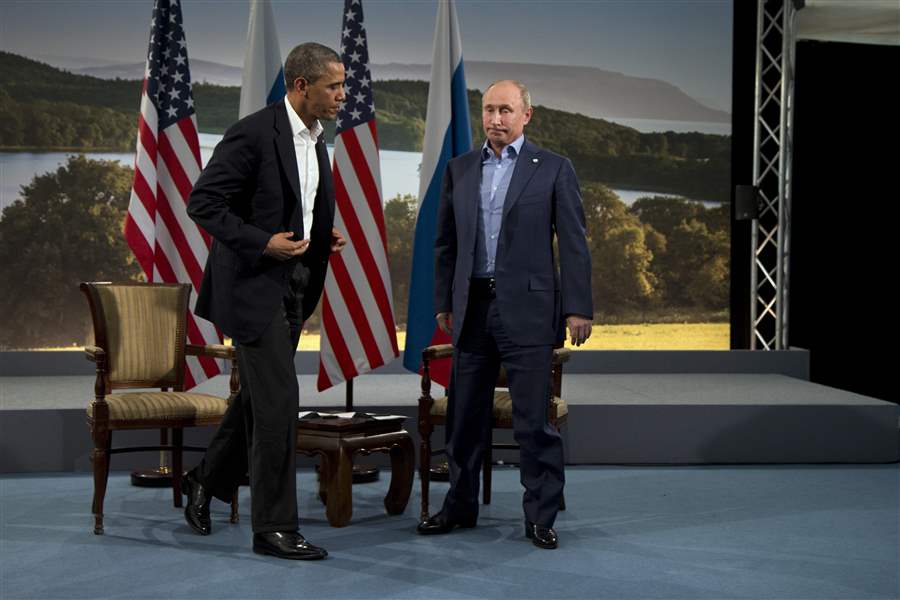
U.S., Russia seek to repair damage from diplomatic 'collisions' over Syria, Snowden
8/9/2013
FILE - In this June 17, 2013 file photo, President Barack Obama and Russian President Vladimir Putin get up to leave after their meeting in Enniskillen, Northern Ireland. The Kremlin voiced disappointment Wednesday, Aug. 7, with Obama's decision to cancel his Moscow summit with Putin, but said it remains ready to cooperate with the United States on bilateral and international issues. (AP Photo/Evan Vucci, File)
ASSOCIATED PRESS
WASHINGTON — The United States and Russia put a brave face today on deteriorating relations, pledging to work together on shared interests even as they nursed frustration over deep differences on issues like missile defense, Syria and the case of NSA leaker Edward Snowden.
Opening high-level talks just two days after the White House cancelled a planned summit between Presidents Obama and Vladimir Putin, Secretary of State John Kerry allowed that U.S.-Russia ties had been complicated by “the occasional collision” and “challenging moments.”
Russian Foreign Minister Sergey Lavrov also acknowledged the fractious state of relations but called on both sides to act like “grown-ups.”
Both men maintained that U.S-Russian cooperation on even limited areas of shared concern is important.
“The relationship between the United States and Russia is, needless to say, a very important relationship, and it is marked by both shared interests and, at times, colliding and conflicting interests and, I think, we are all very clear-eyed about that,” Kerry said as he and Defense Secretary Chuck Hagel welcomed Lavrov and Russian Defense Minister Sergei Shoigu to the talks at the State Department.
Noting that he and Lavrov are both former ice hockey players, Kerry said that they understood “that diplomacy, like hockey, can sometimes result in the occasional collision, so we’re candid, very candid, about the areas in which we agree but also the areas in which we disagree.”
“It’s no secret that we have experienced some challenging moments and obviously not just over the Snowden case,” he said. “We will discuss these differences today, for certain, but this meeting remains important above and beyond the collisions and moments of disagreement.”
Russia has minced no words in expressing its disappointment that Obama cancelled the summit, and Lavrov made it clear that Moscow had been prepared to sign agreements on trade and nuclear research and security had it gone ahead.
“At least we in Russia were prepared to table our proposals to the two presidents,” Lavrov said.
“Of course, we have disagreements. We’ll continue discussing matters on which we disagree calmly and candidly,” he said. “We need to work as grown-ups. And this is what we do. And we hope that this will be reciprocal.”
Russia’s decision last week to grant temporary asylum to Snowden prompted the cancellation of the summit, but relations between Washington and Moscow had already been on a slide.
The White House said there was no sign that progress could be made on significant issues at the summit.
“Summits of leaders are, tend to be, designed around making progress on significant issues,” White House press secretary Jay Carney said Thursday. “And we had not seen that progress sufficiently on a range of issues to merit a summit.”
U.S.-Russia discord had been simmering since Putin regained the Russian presidency more than a year ago.
On returning to power, he adopted a deeply nationalistic and more openly confrontational stance toward the United States than the man he had chosen to succeed him as president in 2008, Dmitry Medvedev, whose tenure roughly overlapped Obama’s first term in the White House.
The U.S. is upset about Moscow’s backing of President Bashar Assad in Syria’s civil war. The two nations also have been at odds over Russia’s domestic crackdown on civil rights, a U.S. missile defense plan for Europe, trade, global security, human rights and American adoptions of Russian children.
The Kremlin expressed disappointment that the White House canceled the summit and blamed it on Washington’s inability to develop relations with Moscow on an “equal basis.” Putin’s foreign affairs adviser, Yuri Ushakov, added that the decision was “clearly linked” to the Snowden case, a situation that he said wasn’t of Russia’s making.
Carney said Snowden was a factor in canceling the summit, but not the only one. Carney said the U.S. would continue to press Russia to return Snowden to the United States to face charges for the unauthorized public release of classified information.
“We have a lot of fish to fry, if you will, with the Russians. We have a lot of issues to engage with the Russians over,” Carney said, emphasizing that Snowden was not the main focus of U.S. engagement with Russia.
“But it is not something that we’re dropping, by any means, and you know, it remains our position that there is ample legal justification to return Mr. Snowden to the United States,” he said.
Former Secretary of State Condoleezza Rice called Russia “a diminished power” and said that Obama was right to cancel the summit with Putin after the “slap in the face” over Snowden.
“On any given day, it’s the 16th economic power” in the world, Rice said on “CBS This Morning” today.
Asked how the United States could explain dropping the Obama-Putin summit, she said, “You have to start with the fact that we have very few overlapping interests any more with Russia.” Rice, who was secretary of state under President George W. Bush, said, ‘You say to Putin, ‘Look, we are not going to sacrifice our national interests to court you.”